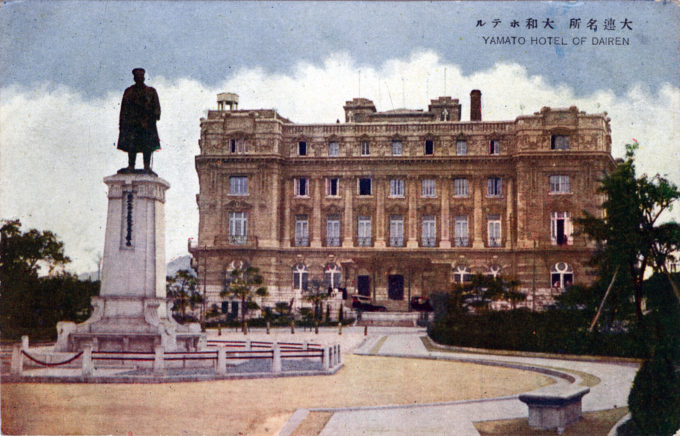“The Yamato Hotel, under the management of the South Manchuria Railway Company, is one of the finest hotels in the Far East. Entirely fire-proof. Heated by hot water, steam and hot air throughout the building. 115 rooms; single, double or en suite, with private bath and lavatory. Telephones in rooms. Otis electric lifts. Electric clocks. Hot and cold running water in all rooms.
“The roof garden commands a splendid view of Dairen and vicinity. Excellent cuisine. Luxurious public rooms, including reading room, lounge, billiard room (with English and American tables), banqueting room, theatre, and private dining rooms. Uniformed porters meet all incoming trains and steamers.”
– Peking, North China, South Manchuria and Korea, published by Thos. Cook & Son, 1924

Yamato Hotel, Dairen, Manchuria, c. 1930. The hotel opened in 1914 under the management of the South Manchuria Railway Company. It is still in operation today as the Dalian Hotel.
See also:
Yamato Hotel, Hoshigaura (Star Beach), Dairen, Manchuria, c. 1920.
South Manchuria Railway Co., c. 1930-1940.
Miscellaneous scenes of Manchukuo, c. 1940.
“Manchukuo has for years been in danger from within and without, and officialdom lives in a perpetual state of alarm. This hotel is a good observation point, for all the foreign journalists are attracted to it. Many of them, unfortunately, are the kind of writers who have come to make as much out of their experience as possible.
“The Japanese do not take that sort very seriously, and they know exactly how much each is paid by the Manchurian government, but as soon as a full – blown journalist arrives, they think that he is a spy. As a matter of fact, everyone thinks that everyone else is a spy in Dairen, and the foreign journalists sit like cats on hot bricks.
“… The Hotel Yamato is the detectives’ head quarters. The servants on every floor are agents and there is more whispering there than in any other hotel in the world. The detectives even watch the members of the Japanese embassy on behalf of the Japanese consulate, and the consulate is in turn responsible to the embassy. And the relationship between civilians and the army is no clearer. The country’s development rests now with the civilians, and the military who brought Manchukuo under Japanese rule are already seeing that they are not reaping their expected reward, but in the end the man who wields the sword must triumph.
“… Three cars flashed up to the hotel door. Japanese soldiers with fixed bayonets sat in the first and third cars and the most powerful man in Manchukuo sprang out of the middle car – His Excellency, the governor of the Kwangtung Leased Territory, Ambassador Extraordinary and Plenipotentiary to Manchukuo, and commanding general of the Japanese troops in Asia. He is responsible, in this threefold capacity, for the domination of the Japanese forces over all the peoples of Manchukuo.
“When the great man hurried into the banqueting room, the page was playing Japanese folk songs on the gramophone. Three hundred officers sat down to dinner and as they talked and smiled, the search lights lit up the sky and messengers constantly came in to speak to the Ambassador.
“The news spread like lightning that Dr. U., the famous Tokyo manipulative surgeon, had arrived and had ordered his meal to be brought up to his room. This man can Westernise Mongolian eyes by tapping a layer of fat in the eye-lids. Rumour has it that Dr. U., specialises in spies, and can make men’s faces look like women’s and change the colour of their eyes. A Japanese, it is said, has already journeyed through Soviet Russia disguised as a Russian with blue eyes.”
– The March of Japan, by Edgar Lajtha, 1937

